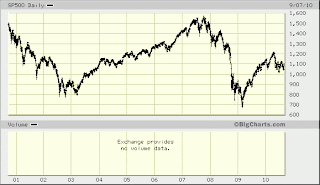Steve was kind enough to forward me this Newsweek article while I was at work today and now I feel the need to share it. http://www.newsweek.com/2010/09/07/young-adults-invest-conservatively-post-recession.html
I have actually witnessed this among some in my age cohort (I just turned 24). I think I can speak fairly well on behalf of my generation when I say that we have not known a good investing climate. I mean, look at it:
That's the S&P500 over ten years and now financial advisors expect my generation, a very cynical and disillusioned lot to start with, to believe that things always do well "over the long term". I know people, and I won't name names, that honestly believe that the best thing you can do with your money is pile it ever higher into government bonds. They have been shell shocked by the grind of the financial version of The Somme into fairly morbid stupidity. Well, I suppose they are chasing performance since treasuries have absolutely butchered stocks over the last decade. However, I also remember after the last major bear market when a couple of my friends in high school told me that the only asset to invest in was "land", trying to evoke an air of nobility about their investments. How did that turn out?
I've been investing, with varying degrees of success, for this period and only this period. I've known nothing else but this horrible market, but it hasn't phased me because, if you are careful, there are winners among the carnage. Also, and this is much more important, it is important to realize that this last decade was somewhat anomalous for two major reasons: 1. The late 1990s bubble and 2. The housing bubble and the subsequent meltdown. Stocks came into the decade about, oh, 40% overvalued. The 1990s would have been a perfectly fine decade in absence of the last major run up, but it got out of hand for a number of reasons I am in the process of writing about for another post. Then of course we had the most serious financial crisis, well, ever since the Great Depression was actually more of a real economic contraction that caused a self-reinforcing financial crisis than the other way around, which is closer to what happened this time.
Admittedly, these sorts of events are not that uncommon in the context of financial market history. Indeed, bad decades (or similar intervals) seem to occur nearly one in every three for the period in which we have modern data. Is there any reason that this pattern seems to hold? There isn't some basic law of nature that dictates this, but it is probably simply a likely coincidence given the variety of market failures that can, do, and will occur.
What all of this means is that do not let past performance, whether bad or good, influence your current decisions too heavily. After a decade (the 1990s) in which stocks committed acts of utter brutality against bonds, it was a mistake to invest in stocks that had an effective earnings yield of 2.5% when bonds had a yield of over 6%. Similarly, right now it probably doesn't make much sense to buy treasuries which have a yield of 2.5% when stocks have an earnings yield of... about 6%. Wait, what? That's weird how that happens isn't it?
Now that we have that out of the way, time to move on to the most recent relapse of the European disaster.

No comments:
Post a Comment